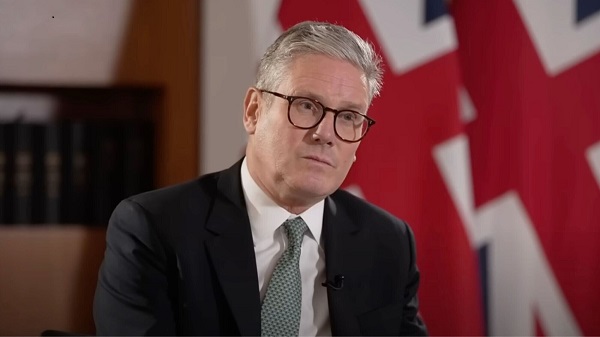Media
Top Five Huge Stories the Media Buried This Week

NEERA TANDEN: “The military requires accountability. It’s the most accountable organization. You are supposed to be accountable to higher-ups. Politics isn’t supposed to have to do with any of this, and the fact that that’s happening, that they’re just basically saying nothing to do here, is a big problem, I think, for those who believe in accountability.”
@ScottJenningsKY: “I think Republicans aren’t interested in any lectures on accountability in the military after the Biden administration. I mean, the bar for getting rid of a Secretary of Defense is apparently pretty high. You can get 13 people killed and go AWOL and not tell the commander in chief, and that’s not a fireable offense.”
“But these lectures about accountability and national security after letting 10 million people into the country who raped and murdered and committed violent acts and no remorse or accountability.”
NEERA TANDEN: “What are you talking about? They closed the border.”
#4 – Bill Gates says we won’t need humans “for most things.”
During an appearance on The Tonight Show, Jimmy Fallon asked Gates a pretty direct question: “Will we still need humans?”
Gates responded, “Not for most things. We’ll decide … There will be some things that we reserve for ourselves, but in terms of making things and moving things and growing food, over time those will be basically solved problems.”
VIDEO: @TheChiefNerd
REP JORDAN: “Is NPR biased?”
MAHER: “I have never seen any political bias.”
JORDAN: “In the DC area, editorial positions at NPR have 87 registered Democrats and 0 Republicans.”
MAHER: “We do not track the voter registration, but I find that concerning.”
JORDAN: “87-0 and you’re not biased?”
MAHER: “I think that is concerning if those numbers are accurate.”
JORDAN: “October 2020, the NYPost had the Hunter Biden laptop story, and one of those 87 Democrat editors said, ‘We don’t want to waste our readers and listeners’ time on stories that are just pure distractions.’ Was that story a pure distraction?”
Video + Transcript via @Kanekoathegreat
While you’re here, don’t forget to subscribe to this page for more weekly news roundups.
#2 – Utah becomes the first state to officially BAN fluoride in all public drinking water.
For decades, fluoride was accepted as a safe way to prevent tooth decay. Few questioned it.
But last year, in a dramatic legal twist, a federal judge ruled that fluoride may actually lower children’s IQ—and cited evidence that could upend everything we thought we knew.
That ruling sent shockwaves through the public health world.
Judge Edward Chen pointed to scientific studies showing a “high level of certainty” that fluoride exposure “poses a risk” to developing brains.
He ordered the EPA to reexamine its safety standards, warning that the margin for safety may be far too narrow.
At the center of the case: dozens of peer-reviewed studies linking everyday fluoride exposure—even at levels found in U.S. tap water—to reduced intellectual capacity in children.
It wasn’t just one paper. The National Toxicology Program, a branch of the U.S. government, also concluded that higher fluoride levels were “consistently associated” with lower IQ in kids.
They flagged 1.5 mg/L as a risk threshold. Some communities hover right near it.
In response to the growing evidence, Utah passed HB 81, banning all fluoride additives in public water.
The law takes effect May 7. It doesn’t ban fluoride completely. Anyone who wants it can still get it—like any other prescription.
And that’s the point: Utah’s lawmakers say this is about informed consent and personal choice.
This issue is no longer on the fringe. Across the country, cities and towns are quietly rethinking water fluoridation—and some have already pulled out. Utah is the first state to take bold action. It may not be the last.
The conversation surrounding fluoride has shifted from “Is it helpful?” to “Is it safe?” And for the first time in nearly a century, that question is being taken seriously.
VIDEO: @TheChiefNerd
#1 – RFK Jr. Drops Stunning Vaccine Announcement
Kennedy revealed that the CDC is creating a new sub-agency focused entirely on vaccine injuries—a long-overdue shift for patients who’ve spent years searching for answers without any support from the government.
“We’re incorporating an agency within CDC that is going to specialize in vaccine injuries,” Kennedy announced.
“These are priorities for the American people. More and more people are suffering from these injuries, and we are committed to having gold-standard science make sure that we can figure out what the treatments are and that we can deliver the best treatments possible to the American people.”
For years, the vaccine-injured have felt ignored or dismissed, as public health agencies refused to even acknowledge the problem. Now, there’s finally an initiative underway to investigate their injuries and to provide support.
Thanks for reading! This weekly roundup takes time and care to put together—and I do my best to make it your go-to source for the stories that matter most but rarely get the attention they deserve.
If you like my work and want to support me and my family and help keep this page alive, the most powerful thing you can do is sign up for the email list and become a paid subscriber.
International
Trump to Confront Starmer Over UK Free Speech Laws During State Visit

Trump’s tour is reportedly set to double as a rebuke of Britain’s approach to online expression.
|
President Donald Trump’s state visit to Britain this week is shaping up to be less about ceremonial pageantry and more about a bitter dispute over censorship and freedom of speech.
Prime Minister Keir Starmer had hoped to use the meeting at Chequers to press for relief from American steel tariffs and to focus on Ukraine and Gaza, but Washington insiders say Trump intends to put Britain’s clampdowns on speech at the very top of the agenda.
The president will land on Tuesday evening. He will attend the usual state functions, including a carriage procession at Windsor, a banquet hosted by King Charles, and a wreath-laying at the tomb of Queen Elizabeth II before heading to Chequers on Thursday for what now promises to be a fraught meeting.
The free speech battle is not new. According to The Independent, Trump previously “berated Keir Starmer over free speech” during private talks at his Turnberry resort in the summer, according to a source close to the president.
That same source added, “There is absolutely no doubt that free speech is going to be one of, if not the top issue, when the two hold talks.”
Fueling the row are recent cases that have drawn international attention: Lucy Connolly’s imprisonment over a tweet, the armed police arrest of comedy writer Graham Linehan at Heathrow, and the UK’s sweeping Online Safety Act.
Reform UK leader Nigel Farage has already carried the argument to Congress, urging Washington to punish Britain for criminalizing online speech.
|
Media
Cancel culture wins ultimate victory as murder of Charlie Kirk ghoulishly celebrated by radical Left, media included

Meanwhile, CBC journo declares nuclear family to be an extremist construct. Plus! Old school journos fight back
I didn’t want to write this week about how Canadian media covered the assassination of Charlie Kirk. There was far too much coverage, way too much raw anger on social media and there’s probably more to come, so I figured it would be best to hold off.
That didn’t work. So this post is a little longer than usual, but it’s all good stuff. Let’s go.
The Rewrite enjoys your support and has no paywall.
Please consider becoming a free or paid subscriber.
First, I have to say this: when people without the capacity to reason hear words with which they disagree and are unable to counter, they get frustrated. Then frustration turns to anger, which leads to demonization which is one bolt action rifle away from violence. We’ve seen it through cancel culture, in which Canada engages enthusiastically, often fueled by media no longer willing to fully defend freedom of speech. That predisposition is neither professional nor helpful if we wish to sustain a healthy, modern liberal democracy.
And we all know there is not a single university in our country that would have permitted Kirk to speak, likely citing the “security” artifice that so often is accepted by media at face value. We are also aware that a great many in the news industry would have supported the shutting down of Kirk (with whom I would have had many differences of opinion).
Take, for instance, the Tweeted reaction to Kirk’s death posted by the former chair of the journalism school at Thompson Rivers University, Alan Bass:
“Do you remember the Nazis? Sometimes unfortunately it’s necessary to kill evil people to save many lives.”
Bass is also listed as an editor for the Canadian Journalism Foundation.
Manitoba’s Minister of Families Nahanni Fontaine was not unhappy Kirk was killed, noting in a post initially missef by legacy media and that she later deleted that he was “racist, xenophic, transphobic, Islamophobic, white nationalist, sexist” you name it – “the man stood for nothing but hate.” She later apologized.
The federally funded news platform Cult Mtl said “to hell“ with Charlie Kirk “you reap what you sow” while a University of Toronto professor who labelled Postmedia fascist was on leave after Tweeting that shooting was “too good” for fascists.
Then, just when I thought there was no more to be said, CBC posted a list of “Some of Charlie Kirk’s most controversial takes” and that he “courted controversy with statements that seemed (my emphasis) designed to provoke those who disagreed with him” – an accusation that could be levelled at the doorstep of pretty much every opinion writer ever. Many on social media interpreted this post as excusing his murder in a “he had it coming” fashion. No doubt Bass enjoyed it, as he would have this piece by the Guardian, the UK’s voice of the Left. Alberta Federation of Labour President Gil McGowan complained CBC wasn’t properly laying blame, the Mother Corp switched from describing Kirk as a prominent conservative commentator to “far right activist” and stirred up a storm by failing to correct an expert who falsely claimed Kirk had called for the execution of gay people. Whew!
Enough. This clip – and it applies to all sides – illustrates the real problem. And I’ll leave it at that. For now.
|
Speaking of tolerating the views of others, .Catherine Cullen, host of CBC’s “award-winning” The House, opened the Mother Corp’s cultural kimono last week and gave us all a good look at the goods while interviewing Industry Minister Melanie Joly. Prime Minister Mark Carney had planned for his cabinet to hear from Kevin Roberts, president of the Heritage Foundation, the US think tank behind Project 2025 and almost certainly a fan of Charlie Kirk.
Joly defended the planned encounter as an exercise in understanding (it never took place) but Cullen focused on what she believed was one of the Heritage Foundation’s most intolerable positions.
“But this is a group that holds positions like this one: Quote, married men and women are the ideal natural family structure because all children have a right to be raised by the men and women who conceive,” said Cullen.
“Tell me about the decision to say we as a government can learn from this person rather than standing up against the positions that he’s advocating for.”
It appears from this statement that, within the CBC culture, the nuclear family is a radical proposition. Certainly some people see it that way. But a lot of people don’t. And while we all know many good people in single parent families, blended families and same sex families, for instance, the structure that so alarms the CBC has been aspired to for many, many thousands of years. It’s not necessary to agree with it. No one imposes it and if people have arguments against it, they can certainly make their case just as those who favour it should be able to do so without condemnation.
Mom, dad and the kids is hardly a radical construct. Just don’t say it out loud around the CBC which appears to have taken it upon itself to not just report the news but to redefine and police our culture.
What Cullen should have done was phrase her question without owning it. She could have conducted the interview by asking something like this:
“Minister Joly, there are some Canadians who strongly disagree with some of the positions promoted by the Heritage Foundation and object to you being open to engaging with them. What’s your response!”
But, she didn’t. The opportunity was instead seized to evangelize for personal beliefs and, in doing so, journalism was harmed.
Switching to CTV, Alberta’s new guidelines for athletics require all participants in female sports to confirm they were assigned to that biological category at birth.
That means students now have to sign a form attesting that is the case. CTV found – or was approached by – a 14-year-old volleyball player who called the guidelines unnecessary and “transphobic.” Its team also found the student athlete’s mother who, equally troubled, said she had spoken to thousands of parents and “Nobody is worried about their girls playing with trans girls and getting hurt in unfair play.”
Reporters Angela Amato and Connor Hogg apparently agreed because, despite assigning them both to the story, CTV was unable to find any parents in Alberta who agreed with the new sports guidelines. Indeed, it’s unclear they even tried.
Which is too bad because had they done so they could have produced a pretty interesting, fulsome story establishing a range of perspectives on the issue and fully informing their viewers and readers. Instead, they left one side of the debate convinced CTV is hostile to its perspective and diminished public trust in their craft and their employer.
Brickbat this week goes to Glen McGregor of Rogers‘ City News for completely unnecessary smartassery when he used his Twitter account to point out a typo in a Conservative Party news release. As he well knows, there is no shortage of political partisans on social media who are happy to mock their opponents on these occasions. McGregor inserting himself into their ranks only fueled public mistrust in journalism and City News’s reputation as an outlet that can be trusted to report without prejudice.
And a bow goes to Brian Kappler – who had a great career reporting for the Montreal Gazette and as a member of the Parliamentary Press Gallery – for his dismantling of a CBC News report following Carney’s Monday announcement of things he says his government will do. Parental warning applies.
“Carney will never need sex again after this blow job,” Tweeted Kapler. “600 promises/claims in this; not one balanced with a performance check. Not one hint that all these handouts will blow up the deficit. And “elbows up” – once parroted so lovingly by CBC – has vanished down the memory hole.”
Undaunted, CBC’s The National carried on and its coverage was described to me by another journalist:
“CBC led the newscast with six minutes of discussion out of a news release event in St John’s. Reporter wasn’t even there, just used video and multiple clips from the event, then filed out of Ottawa.
“Followed with boring talkback about more undefined help coming for business affected by tariffs. I mean, it’s not even effective propaganda.. They’re boring the audience to death.”
And there you have it. Yours truly isn’t the only one in despair for the trade within which he once toiled.
(Peter Menzies is a commentator and consultant on media, Macdonald-Laurier Institute Senior Fellow, a past publisher of the Calgary Herald, a former vice chair of the CRTC and a National Newspaper Award winner.)
Invite your friends and earn rewards
-

 Business1 day ago
Business1 day agoDeportations causing delays in US construction industry
-

 Frontier Centre for Public Policy14 hours ago
Frontier Centre for Public Policy14 hours agoBloodvein Blockade Puts Public Land Rights At Risk
-

 Business2 days ago
Business2 days agoRed tape is killing Canadian housing affordability
-

 Health2 days ago
Health2 days agoMAiD should not be a response to depression
-

 Alberta19 hours ago
Alberta19 hours agoParents group blasts Alberta government for weakening sexually explicit school book ban
-

 Crime1 day ago
Crime1 day agoCanadian teacher showed Charlie Kirk assassination video to young students, said he deserved to die
-

 International2 days ago
International2 days agoTrump to Confront Starmer Over UK Free Speech Laws During State Visit
-

 Alberta2 days ago
Alberta2 days agoAlberta updates TIER system: Businesses can direct compliance payments to on-site technologies















